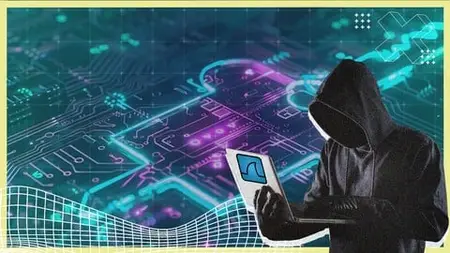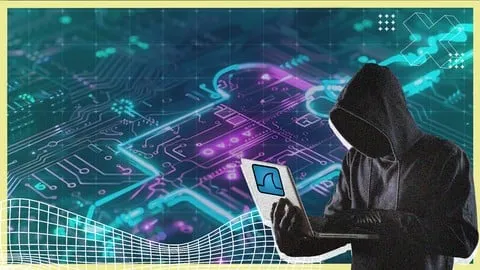Network Security: Mastering Cybersecurity, Ethical Hacking
Last updated 2/2025
MP4 | Video: h264, 1920x1080 | Audio: AAC, 44.1 KHz
Language: English | Size: 10.00 GB | Duration: 11h 30m
Last updated 2/2025
MP4 | Video: h264, 1920x1080 | Audio: AAC, 44.1 KHz
Language: English | Size: 10.00 GB | Duration: 11h 30m
Dive deep into the world of network security with our comprehensive course designed for both beginners and professionals
What you'll learn
Network Security Fundamentals – Learn key security principles and how to protect networks from cyber threats.
Threat Modeling & Risk Management – Discover how to analyze network threats and create security policies.
Firewall Detection & Bypass – Understand Web Application Firewalls (WAFs), Intrusion Prevention Systems (IPS), and evasion techniques.
Mastering Nmap for Network Scanning – Learn Nmap network scanning, OS fingerprinting, and advanced reconnaissance.
Penetration Testing on Web Servers – Detect web vulnerabilities, misconfigurations, and attack vectors.
Bypassing Network Access Controls – Learn how to bypass MAC filtering and detect unauthorized access points.
Packet Sniffing & Traffic Analysis with Wireshark – Capture, filter, and analyze network traffic for forensic investigations.
Deep Dive into TCP/IP & Network Protocols – Understand IP, TCP, UDP, ARP, DNS, DHCP, HTTP, ICMP, and more.
TcpDump & Tshark for Advanced Packet Analysis – Learn command-line network sniffing and traffic monitoring techniques.
Detecting & Analyzing Network Attacks – Identify failed scans, network intrusions, and suspicious activity.
Requirements
Computer: A laptop or desktop with at least 2 CPUs, 2 GB of RAM, and 8 GB of storage.
Operating System: Wireshark is compatible with Windows, macOS, and Linux.
Internet Connection: For downloading software and accessing course materials.
Description
Become a Network Security ExpertsIn today's digital age, cybersecurity threats are growing more advanced, and network security has never been more important. Whether you're an IT professional, network administrator, ethical hacker, or penetration tester, securing your network and understanding how hackers exploit vulnerabilities is a must-have skill.This comprehensive and hands-on course is designed to take you from beginner to advanced levels in network security, ethical hacking, Nmap scanning, firewall detection, packet analysis with Wireshark, and much more. You’ll dive deep into network mapping, vulnerability assessment, reconnaissance techniques, intrusion detection, and advanced penetration testing.With real-world demonstrations, step-by-step tutorials, and hands-on labs, this course equips you with practical skills to detect security flaws, analyze traffic, and defend networks against attacks. You will learn how hackers and security professionals approach cybersecurity—giving you the knowledge to protect networks before cybercriminals exploit them.By the end of this course, you will be confident in securing, scanning, and analyzing networks, bypassing firewalls, capturing and interpreting packets, and conducting in-depth penetration tests using industry-standard tools like Wireshark, Nmap, TcpDump, and Tshark.If you are looking to build a career in network security, penetration testing, ethical hacking, or cybersecurity, this course is a goldmine of knowledge, filled with practical scenarios, real-world attacks, and countermeasures.
Overview
Section 1: Fundamentals of Network Security
Lecture 1 Introduction
Lecture 2 3 Main Ways to Make your Network Safer
Lecture 3 A Chain is no stronger than its weakest link
Lecture 4 What is Network Maps in Cyber Security
Section 2: Network Security Concepts
Lecture 5 Main Guidelines for Network Security
Lecture 6 Analysis to Consider and Action Priority
Lecture 7 Threat Modeling
Section 3: Detecting Firewalls
Lecture 8 Web Application Firewall and IPS Detection
Section 4: Introduction to Networking
Lecture 9 What is network protocol and what it does
Lecture 10 Layers of TCP/IP Model
Lecture 11 How emails sent and received over internet
Lecture 12 PDU Explained
Lecture 13 Basic Use of Switch and Data Transmission
Lecture 14 2 Networks Talking with Router in Middle
Section 5: Bypassing Network Access Control
Lecture 15 Introduction to Section and Fundamentals of Media Control Filtering
Lecture 16 Linux WAP and Bypassing Mac Filtering
Section 6: Starting Practical with Nmap
Lecture 17 Nmap's Network Scanning Capabilities
Lecture 18 Beginning to Using NSE Scripts
Lecture 19 Port scanning on Servers
Lecture 20 Port scanning techniques and Interface Selection
Lecture 21 Nmap Using Target List and Exclude Listr with CIDR
Lecture 22 Nmap Operating System Detection
Lecture 23 Random Port Scanning and Legal Issues
Section 7: Being Real Nmap Pro
Lecture 24 Unique Techniques that you'll learn in this section
Lecture 25 Advanced TCP ACK and SYN Scan
Lecture 26 Advanced ICMP
Section 8: Reconnaissance with Nmap
Lecture 27 Reconnaissance with Nmap
Lecture 28 IP Geolocation and WhoIS using Nmap
Lecture 29 Graphical Traceroute
Section 9: Scanning Web Servers with Nmap
Lecture 30 Explanation and What Skills you'll earn in this section
Lecture 31 Scanning HTTP Methods and Potential Risks
Lecture 32 Searching for Digital Gold in the Web Server Maze
Section 10: Detecting Firewalls
Lecture 33 Web Application Firewall and IPS Detection
Section 11: Learning Path
Lecture 34 What is Ethical Hacking and Network Security
Lecture 35 OSI Model
Section 12: Packet Analysis and Networking
Lecture 36 What, Why and When's of Packet Analysis
Lecture 37 Understanding Layer 1,2,3 - Hubs, Switches and Routers
Lecture 38 Traffic Classifications
Section 13: Sniffing
Lecture 39 How Packet Analysis works
Lecture 40 Hubs are best for us but everyone is using Switch
Lecture 41 How To's of Network Sniffing
Section 14: Getting Started with Wireshark
Lecture 42 Why everyone is using Wireshark
Lecture 43 Downloading and Installing Wireshark
Lecture 44 Installing and Configuring Wireshark and other Tools in Linux
Lecture 45 Integrated or External WiFi Adapters
Lecture 46 Customizing Wireshark
Section 15: Capturing Packets
Lecture 47 Saving and Merging Packets
Lecture 48 Capture Options
Lecture 49 Capture Filters
Lecture 50 Display Filters
Lecture 51 Starting with Filters in Wireshark
Section 16: TcpDump and TShark
Lecture 52 Installing TcpDump and Tshark
Lecture 53 Working with Tshark and TCPDump
Section 17: Network Layer Structures and Operations
Lecture 54 Address Resolution Protocol
Lecture 55 Internet Protocol (IP)in Theory
Lecture 56 Time to Live and Routing Behavior
Lecture 57 Structure of TCP
Lecture 58 Detailed Analysis of Random TCP Packet
Lecture 59 Structure of UDP
Lecture 60 UDP Packet analysis - DNS Response
Lecture 61 Full DHCP Communication Packet Analysis with Wireshark
Lecture 62 HTTP Packet Structure
Lecture 63 HTTP Communication Analysis
Section 18: Magic with Packet Analysis
Lecture 64 Packets don't lie
Lecture 65 How a Failed Network Scan looks like
Lecture 66 Analyzing how Port Scans work Wireshark Statistics
System Administrators: Gain insights into network performance and security to manage systems more efficiently.,Network Administrators and Engineers: Enhance your ability to monitor, analyze, and troubleshoot network traffic effectively.,Students and Enthusiasts: Acquire practical knowledge of network protocols and packet analysis to build a strong foundation in networking.



